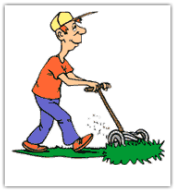Lawn services offered:
|
Contact Lerry to schedule a bid
|
What are natural & organic practices?
Natural lawn care in a nutshell Natural lawn care does not provide instant results. Think long-term (several years) instead of short-term care.
Natural lawn care is not just about using natural products or organic fertilizers. It becomes an annual process and not just a list of individual lawn care events. Over time, we are building and promoting a balanced soil of organic matter and a healthy population of soil microorganisms while following good cultural practices to promote healthy plants.
Natural lawn care, like any lawn care program, is not perfect. It may take a little extra effort to pull a weed from time to time or to use a synthetic herbicide to spot treat broadleaf weeds. This may be a small price to pay for the satisfaction of knowing that your lawn is being maintained naturally, responsibly and in an environmentally sound manner.
"Keeping It Simple" is the best approach to natural lawn care. It does not require a large product inventory to maintain a lawn. Following best management practices while incorporating a few key lawn care products is all it takes.
Measuring your lawn and testing the soil are the first pieces of information you need to know about any lawn. Then simply follow good cultural practices — mowing, fertilizing, watering and overseeding. Applying minerals once in the spring or fall with three applications of organic fertilizers (some containing corn gluten) will provide a good natural lawn. Other beneficial products can be added based on a soil test or as dictated by your lawn.
Protecting surface and groundwater quality is a serious environmental issue. Following a natural lawn care program is one way that homeowners, lawn care operators and professional turfgrass managers can protect the groundwater and improve their environmental stewardship. (excerpted from University of Missouri Extension Service publication on Natural Lawn Care)
Natural lawn care is not just about using natural products or organic fertilizers. It becomes an annual process and not just a list of individual lawn care events. Over time, we are building and promoting a balanced soil of organic matter and a healthy population of soil microorganisms while following good cultural practices to promote healthy plants.
Natural lawn care, like any lawn care program, is not perfect. It may take a little extra effort to pull a weed from time to time or to use a synthetic herbicide to spot treat broadleaf weeds. This may be a small price to pay for the satisfaction of knowing that your lawn is being maintained naturally, responsibly and in an environmentally sound manner.
"Keeping It Simple" is the best approach to natural lawn care. It does not require a large product inventory to maintain a lawn. Following best management practices while incorporating a few key lawn care products is all it takes.
Measuring your lawn and testing the soil are the first pieces of information you need to know about any lawn. Then simply follow good cultural practices — mowing, fertilizing, watering and overseeding. Applying minerals once in the spring or fall with three applications of organic fertilizers (some containing corn gluten) will provide a good natural lawn. Other beneficial products can be added based on a soil test or as dictated by your lawn.
Protecting surface and groundwater quality is a serious environmental issue. Following a natural lawn care program is one way that homeowners, lawn care operators and professional turfgrass managers can protect the groundwater and improve their environmental stewardship. (excerpted from University of Missouri Extension Service publication on Natural Lawn Care)
Summer's here!
Let us help you enjoy your life all year round by starting at the base: the soil. It is where all the plants come from, and, let's face it, they do feed the rest of us.... if there were no plants how would we enjoy steaks, and chickens, and eggs, and cheese?!?!? Okay, so maybe they're not eating your lawn, but can you get the picture how everything is connected?
Let us help you enjoy your life all year round by starting at the base: the soil. It is where all the plants come from, and, let's face it, they do feed the rest of us.... if there were no plants how would we enjoy steaks, and chickens, and eggs, and cheese?!?!? Okay, so maybe they're not eating your lawn, but can you get the picture how everything is connected?
|
The state of the union... from the Earth's perspective. A 2012 current event.
|
Cornell University's Home Gardening site
|
University of Missouri's searchable weed database
|
Cool info about insects & spiders with a searchable database
|

